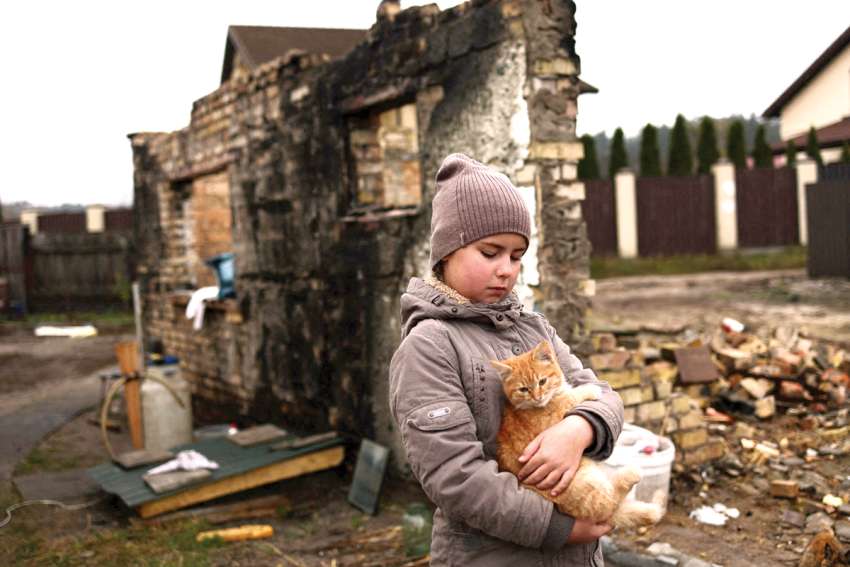One year since Russia broached Ukraine’s sovereign territory, it is worldwide Christian solidarity and support, together with hands-on help from humanitarian organizations such as Aid to the Church in Need (ACN), that have kept Ukrainian morale high and helped the Ukrainian Church fulfill its pastoral and spiritual mission during its darkest days, says Archbishop Sviatoslav Shevchuk,
The leader of the Ukrainian Greek Catholic Church was sharing his thoughts at a Feb. 8 virtual conference organized by ACN International to mark the passing of a year since a year’s-long conflict with Russia escalated into a full-blown war.
“It’s a miracle that we are still alive, a year after the full-scale war with Russia broke out,” he said. “We not only managed to survive but also to serve our people, victims of the war, thanks to Christians worldwide standing in solidarity with us, united with us in prayers and thoughts, and in generosity.”
He emphasized that the survival was accomplished against heavy odds, including a rapid worsening of the humanitarian crisis, with 15 million Ukrainians being forced to flee their homes, seven million of whom are now refugees who have settled in other countries, the rest being internally displaced persons within Ukraine.
Shevchuk explained that despite the liberation of half the territories that were occupied by Russia after the initial onslaught, the situation is still grave. He said his Church had received reports of two priests — Fr. Ivan Levitsky and Fr. Bohdan Geleta — being arrested and tortured by the Russians in an attempt to extract false confessions from them. The two priests have been accused of being leaders of the resistance against Russian troops. So far, efforts to rescue them have not been successful, the archbishop added.
“The parishioners in our liberated territories are crying out to us for help as well,” he said.
He continued that in the early stages of the war, many Ukrainians sought a measure of safety in the Western part of the country, but the poorest of the poor were unable to travel there.
“But now, hundreds of thousands of Ukrainians have been liberated and are returning to their homes, but are finding that there is no electricity or heating there. Russia has methodically destroyed our infrastructure. Blackouts are now a normal feature of life. We don’t know what to expect in the future. Russia is escalating the situation, and constant bombing is our everyday reality,” he said.
But all is not doom and gloom, he pointed out.
“The Church was able to look after its flock and nobody died of cold and hunger even during the four days and nights of blackout that the city of Odessa experienced recently,” he said.
He also referred to the release of some prisoners of war Pope Francis helped to negotiate.
Archbishop praises international aid at one-year mark of war with Russia
“Some Ukrainians are angry at anyone who has any relationship with Russians, but we are grateful to the Holy Father for being in touch with the Russians,” he said
Outlining the most urgent needs of the people, the archbishop emphasized that pastoral care in terms of healing the physical and psychological wounds of the people is the Church’s most important priority at the moment.
“People not only expect food and clothes from us, but a word of hope,” he said. “As a Church, we are giving them hope and inner strength to survive, to make sense of a senseless situation. We also need to maintain the functionality of our buildings, because we can be more efficient if we work as a community.”
Archbishop Visvaldas Kulbokas, Apostolic Nuncio to Ukraine, another conference speaker, spoke of Ukrainians’ hopes and dreams for the future. He summarized the story of a Ukrainian officer from the Azov battalion, who was a prisoner of war from May 19 to the end of September after being seriously wounded during the defense of Mariupol. In answer to a question on what victory meant to him, the officer said: “We went to defend our people, and our families, not our government. We want to build a beautiful Ukraine, united and free of corruption. A country built on human values and humanity. We need to stay strong.”
The nuncio spoke of the importance and urgent need of charity, prayer and pastoral work.
“When parish priests bring bread to the people, they eat it immediately. They have no food and no water to wash.”
Thomas Heine-Geldern, executive president of ACN International, assured the Ukraine Church leader that ACN will stay on the side of Ukraine.
“Our cooperation with Ukraine started shortly after the fall of the Iron Curtain, and we continue to help you to fulfill your pastoral and spiritual mission,” Heine-Geldern said.
Giving a few examples of the 300 humanitarian projects that have been taken on by ACN since the outbreak of the war, he said the organization has helped 16,000 people including 700 priests and 700 seminarians. Besides providing for material needs such as generators to supply power during frequent blackouts, ACN helped organize spiritual retreats for over 3,200 people.
Heine-Geldern said the Ukrainian Catholic Church had not abandoned its flock in their hour of need.
“I spoke recently to the Bishop of Odessa, who said 68 of his priests had refused to leave and had stayed behind to minister to their parishioners.”
He asked the Church leaders to convey their most urgent needs to ACN, which he promised they will do their best to meet.
“Please don’t forget Ukraine even if we are not in the news any more,” Shevchuk pleaded. After expressing his deep gratitude to all benefactors, he added: “Without the help of our benefactors, we wouldn’t survive.”
Both Shevchuk and Heine-Geldern concluded on a note of hope.
“If we can survive for one year, Ukraine will prevail,” said Shevchuk.
“We are now preparing for Lent, but we are also preparing for the Resurrection,” Heine-Geldern said. “We hope for better times for Ukraine.”


